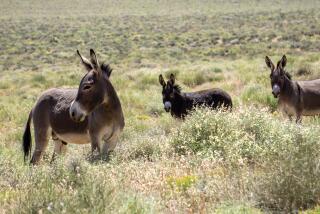HORSES : Volunteers at Pegasus Foundation Encourage Putting Out to Pasture
- Share via
They are a far cry from the hordes of fancy horses on the Orange County show circuit. Thousands of discarded horses--some of which were champions in their heyday--sit in holding pens, awaiting shipment to what was once known as the “glue factory.”
Some Orange County horsepeople are determined to change that. Through the efforts of Kate Roth of San Juan Capistrano and several volunteers, about 50 horses in the past six months have been snatched from sure death and matched with loving owners.
One recent success story was a quarter horse gelding that had been abused as a performance horse.
In one of her periodic visits to a “feed lot”--where horses are kept before they’re slaughtered for human consumption--Roth took an interest in the horse.
“He looked really cute,” she said, “and had a good personality,” which made him an ideal prospect for adoption as a pleasure horse.
A few days later, Roth returned to find the horse with a gaping shoulder wound, apparently caused by stallions kept with him in the pen.
“He stood in a corner and was totally depressed,” Roth said. She immediately arranged to buy the horse, which was to be shipped to slaughter the next day.
Today the horse lives on a farm in Los Angeles County, where he is ridden strictly for pleasure.
Another horse in the holding pen, a thoroughbred gelding that had won $175,000 for his former owner, had stepped on a nail and could no longer race.
“He was sent to slaughter,” said Roth, shaking her head. “We want to save them all, but unfortunately, we can’t.”
There simply are not enough resources to rescue all the horses that need help, although Roth hopes that someone will donate funds or a parcel of land to use as a sanctuary for needy horses.
Her newly formed “horse rescue network,” the Pegasus Foundation, is in the process of becoming a nonprofit corporation.
Roth funds the operation largely with her own money. Her organization pays the “killer price”--what the slaughterhouse pays--for a horse, then arranges for it to be adopted by a family for the cost of purchase, board and medical care required during the rescue. Usually the total price is less than $1,000, far less than the cost of most pleasure or show horses.
Roth attributes the problem of abandoned horses to “the disposable society.” Some horse owners, she said, shirk their responsibility when an animal has outlived its use for them.
“It’s the same as disposable products,” she said. “These horses are just dumped.”
Others end up without a home due to a change in family circumstances.
Roth’s organization recently received a call from a man who had been incarcerated and had 14 horses to give away. She found homes for all of them.
One of the volunteers concentrates on finding a proper match between horse and rider.
She rides the prospective adoption horses and sometimes brings people directly to the holding pens to “meet” the horses. Chemistry is the key.
“Our goal is to find a good family for these horses,” Roth said. “If the horse would be good in the show ring, we try to find a (horse) show family.
“Other horses have been so abused that we need to find them a quiet quality of life. These animals all deserve to have a second chance.”
For more information, call (714) 493-2775 or write: Pegasus Foundation, PO Box 1285, San Juan Capistrano, Calif. 92693.
More to Read
Sign up for Essential California
The most important California stories and recommendations in your inbox every morning.
You may occasionally receive promotional content from the Los Angeles Times.













